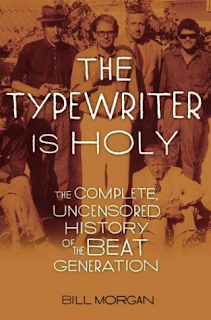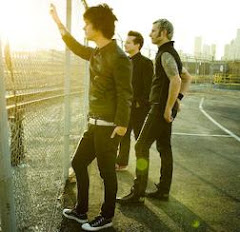
“The Typewriter is Holy: The Complete, Uncensored History of the Beat Generation” by Bill Morgan was released this summer along with “Jack Kerouac and Allen Ginsberg: The Letters,” edited by Morgan and David Stanford. Morgan is a prolific author on all things beat - and it’s more than a bit incongruous to see the vastly different volumes side by side. I read “The Letters” first, then followed it up with “The Typewriter is Holy.” While the former is a “must read” (if not a “must own”) for fans of the beat generation, I have some mixed feelings about the latter.
First off, my pet peeve about long winded subtitles (“complete uncensored”) is juxtaposed against the books contents: a slim, thumbnail sketch (“concise” to be charitable) of the “history” of the somewhat amorphously defined generation. Instead of sticking with the core members, Kerouac, Ginsberg, William Burroughs - and building upon their interactions with collaborators, friends and muses - Morgan casts an unnecessarily wide net. His working definition of it seemed to be that any friend and associate of Allen Ginsberg qualified for inclusion!
Second, while I wholeheartedly agree with Morgan’s premise that Ginsberg was the motivating force who propelled the “beat generation” into existence (building on Kerouac’s coinage of the term itself) by his sheer determination to publicize their collective works (and antics?), the lengths he goes to include “members” can be extreme. It’s hardly conceivable that any scholar of the beat generation - however broadly it is defined - would include Paul Bowles!
Again, while employing Ginsberg and his circle as the framework, Morgan’s “history” tapers off after the death of Neal Cassady and Kerouac in the late 60's. He skims the 70's (touching on the “Jack Kerouac School of Disembodied Poetics” and Gary Synder’s “Turtle Island”), and the 80's (the resurgence of interest in Kerouac and the beats) - but plenty of history is left off the big table. Morgan does mention the significant Ginsberg - Bob Dylan relationship, but overlooks Ginsberg’s connection with “The Clash” in the early 80's (especially Ginsberg’s connection to the Clash shows at Bonds) and work with Paul Mccartney in the early 90's (“Ballad of the Skeletons”). Nor does he explore William Burrough’s influence on Patti Smith.
Still, “The Typewriter is Holy” is worth reading - if only to reintroduce the now quaintly antique term “typewriter” to this generation of texters. Morgan knows his stuff - and I hope this book would, in turn, bring readers to his biography of Allen Ginsberg (which is fantastic) - or to reading “The Letters” as a follow-up. The only serious drawback of this slim volume, which is a result of the format, is the lack of any discussion of the literature these beats produced.
Wednesday, September 15, 2010
"the typewriter is holy: the complete, uncensored history of the beat generation" book review
Labels:
allen ginsberg,
beat generation,
book review,
jack kerouac
Subscribe to:
Post Comments (Atom)




















No comments:
Post a Comment